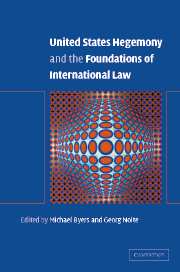Book contents
- Frontmatter
- Contents
- List of contributors
- Preface
- Introduction: the complexities of foundational change
- PART I International community
- 1 The international community, international law, and the United States: three in one, two against one, or one and the same?
- 2 The influence of the United States on the concept of the “International Community”
- 3 Comments on chapters 1 and 2
- PART II Sovereign equality
- PART III Use of force
- PART IV Customary international law
- PART V Law of treaties
- PART VI Compliance
- Conclusion
- Index
1 - The international community, international law, and the United States: three in one, two against one, or one and the same?
Published online by Cambridge University Press: 13 July 2009
- Frontmatter
- Contents
- List of contributors
- Preface
- Introduction: the complexities of foundational change
- PART I International community
- 1 The international community, international law, and the United States: three in one, two against one, or one and the same?
- 2 The influence of the United States on the concept of the “International Community”
- 3 Comments on chapters 1 and 2
- PART II Sovereign equality
- PART III Use of force
- PART IV Customary international law
- PART V Law of treaties
- PART VI Compliance
- Conclusion
- Index
Summary
When governments, urged along by civil society, come together to create the International Criminal Court, that is the international community at work for the rule of law. When we see an outpouring of international aid to the victims of recent earthquakes in Turkey and Greece – a great deal of it from those having no apparent link with Turkey or Greece except for a sense of common humanity – that is the international community following its humanitarian impulse. When people come together to press governments to relieve the world's poorest countries from crushing debt burdens … that is the international community throwing its weight behind the cause of development. When the popular conscience, outraged at the carnage caused by land mines, succeeds in banning these deadly weapons, that is the international community at work for collective security. There are many more examples of the international community at work, from peacekeeping to human rights to disarmament and development. At the same time there are important caveats. The idea of the international community is under perfectly legitimate attack because of its own frequent failings.
Kofi A. Annan, Secretary-General of the United NationsHow does one reconcile the position of the United States as the single superpower with the realities of interdependence and an ever-expanding international legal order that governs relations in the international community?
- Type
- Chapter
- Information
- Publisher: Cambridge University PressPrint publication year: 2003
- 3
- Cited by

